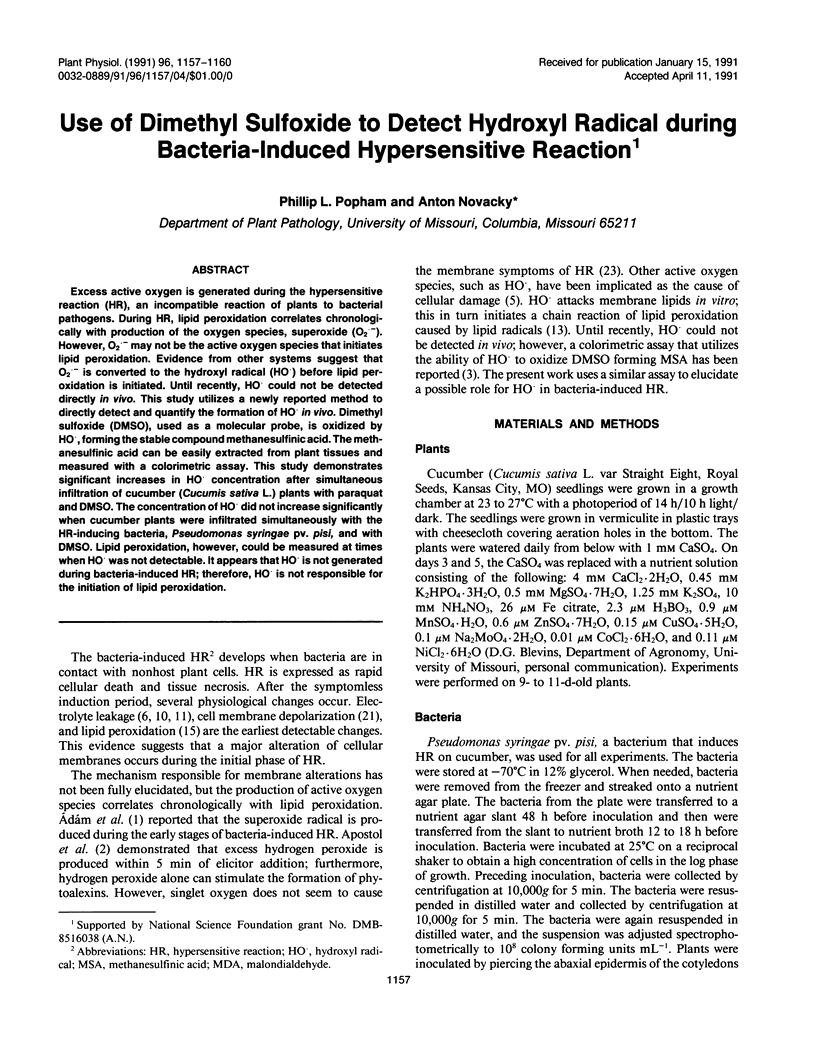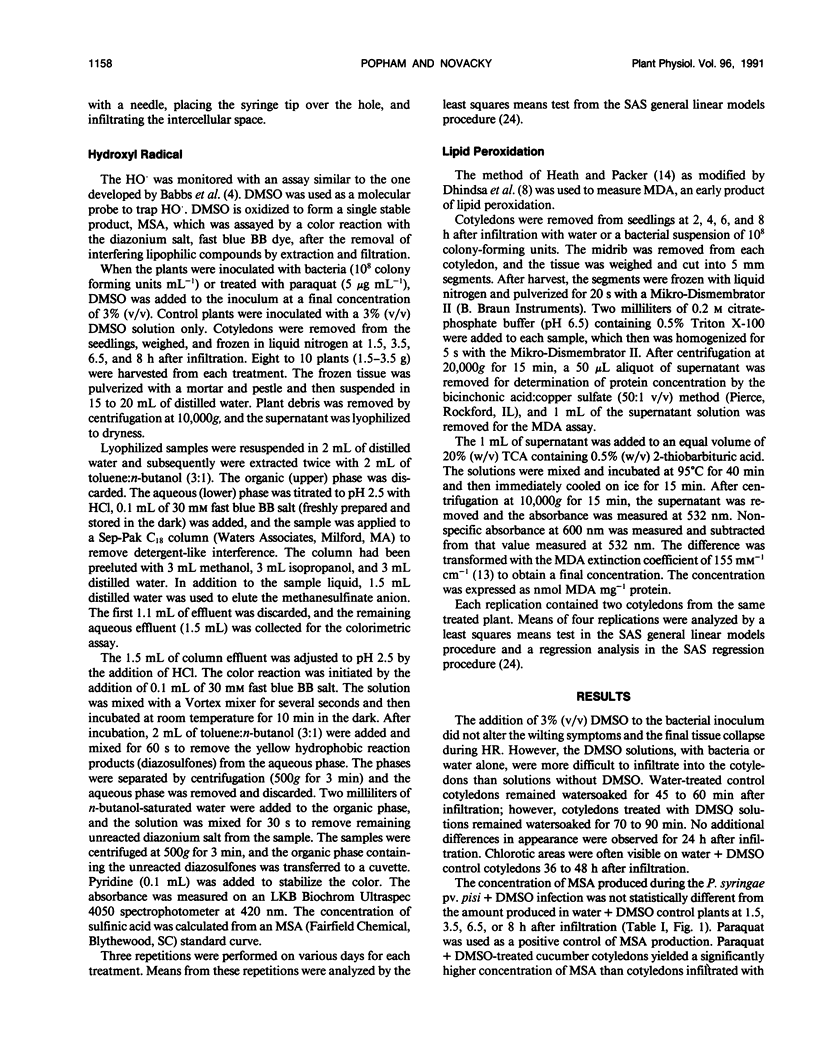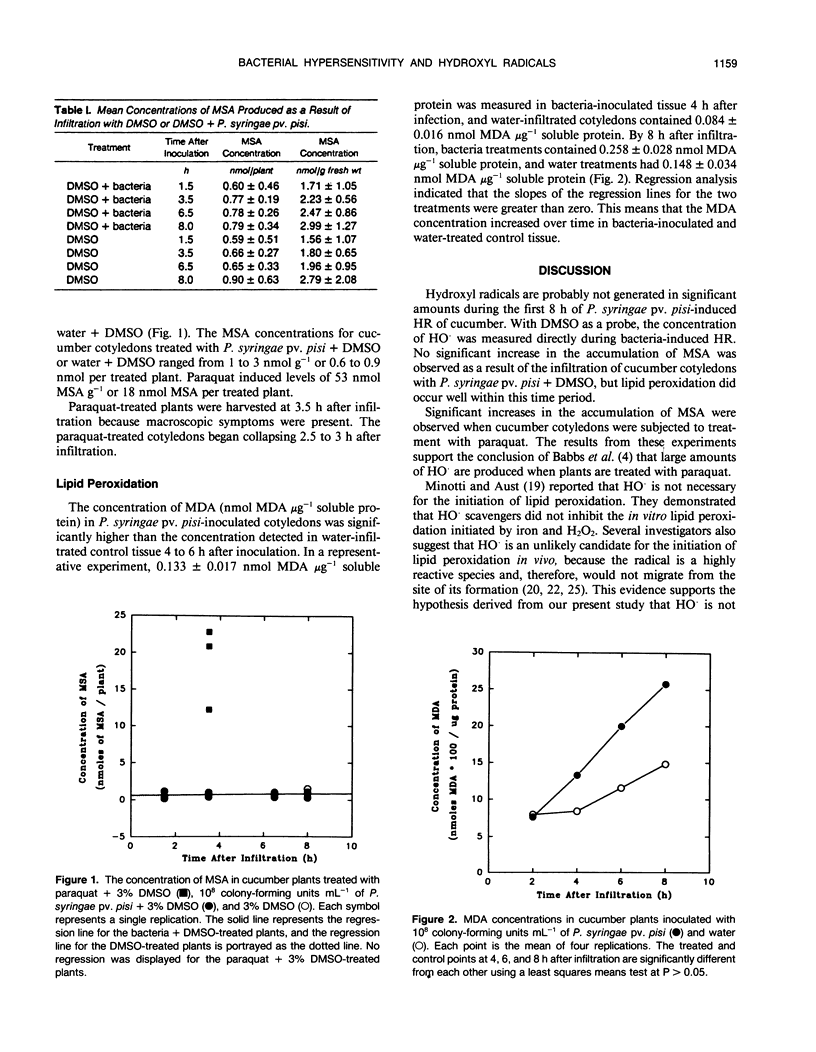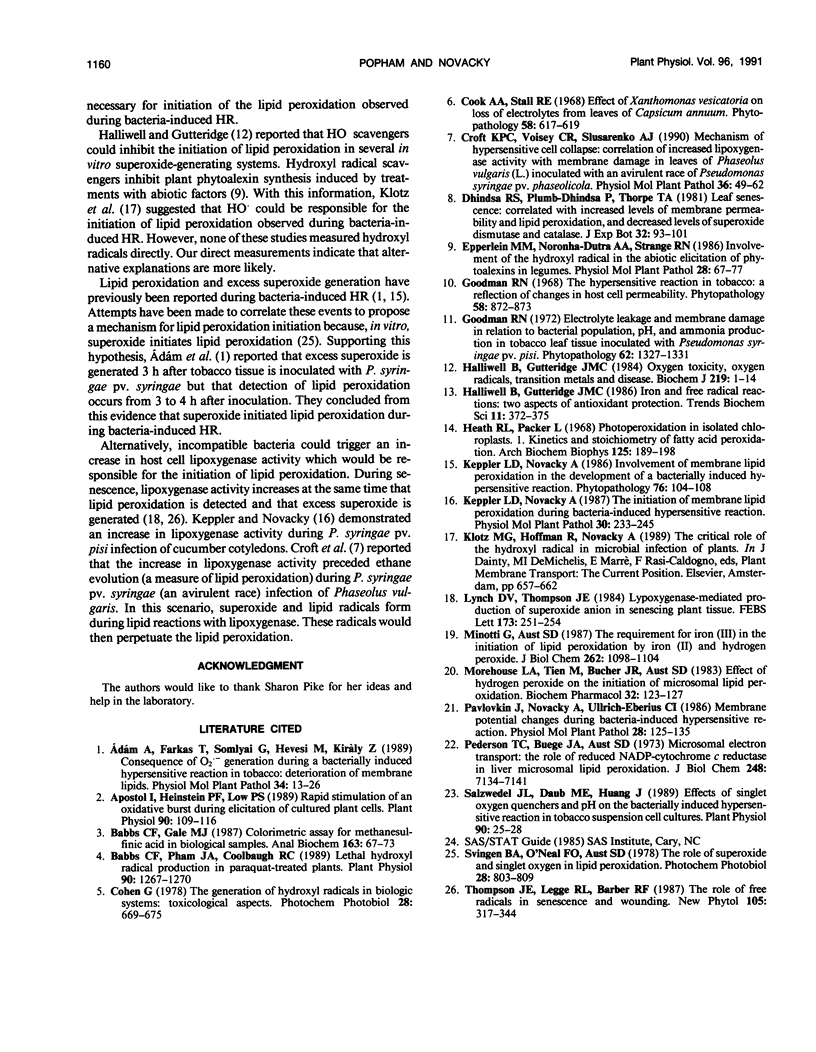Abstract
Excess active oxygen is generated during the hypersensitive reaction (HR), an incompatible reaction of plants to bacterial pathogens. During HR, lipid peroxidation correlates chronologically with production of the oxygen species, superoxide (O2.−). However, O2.− may not be the active oxygen species that initiates lipid peroxidation. Evidence from other systems suggest that O2.− is converted to the hydroxyl radical (HO.) before lipid peroxidation is initiated. Until recently, HO. could not be detected directly in vivo. This study utilizes a newly reported method to directly detect and quantify the formation of HO. in vivo. Dimethyl sulfoxide (DMSO), used as a molecular probe, is oxidized by HO., forming the stable compound methanesulfinic acid. The methanesulfinic acid can be easily extracted from plant tissues and measured with a colorimetric assay. This study demonstrates significant increases in HO. concentration after simultaneous infiltration of cucumber (Cucumis sativa L.) plants with paraquat and DMSO. The concentration of HO. did not increase significantly when cucumber plants were infiltrated simultaneously with the HR-inducing bacteria, Pseudomonas syringae pv. pisi, and with DMSO. Lipid peroxidation, however, could be measured at times when HO. was not detectable. It appears that HO. is not generated during bacteria-induced HR; therefore, HO. is not responsible for the initiation of lipid peroxidation.
Full text
PDF



Selected References
These references are in PubMed. This may not be the complete list of references from this article.
- Apostol I., Heinstein P. F., Low P. S. Rapid Stimulation of an Oxidative Burst during Elicitation of Cultured Plant Cells : Role in Defense and Signal Transduction. Plant Physiol. 1989 May;90(1):109–116. doi: 10.1104/pp.90.1.109. [DOI] [PMC free article] [PubMed] [Google Scholar]
- Babbs C. F., Gale M. J. Colorimetric assay for methanesulfinic acid in biological samples. Anal Biochem. 1987 May 15;163(1):67–73. doi: 10.1016/0003-2697(87)90093-5. [DOI] [PubMed] [Google Scholar]
- Babbs C. F., Pham J. A., Coolbaugh R. C. Lethal hydroxyl radical production in paraquat-treated plants. Plant Physiol. 1989 Aug;90(4):1267–1270. doi: 10.1104/pp.90.4.1267. [DOI] [PMC free article] [PubMed] [Google Scholar]
- Cohen G. The generation of hydroxyl radicals in biologic systems: toxicological aspects. Photochem Photobiol. 1978 Oct-Nov;28(4-5):669–675. doi: 10.1111/j.1751-1097.1978.tb06993.x. [DOI] [PubMed] [Google Scholar]
- Halliwell B., Gutteridge J. M. Oxygen toxicity, oxygen radicals, transition metals and disease. Biochem J. 1984 Apr 1;219(1):1–14. doi: 10.1042/bj2190001. [DOI] [PMC free article] [PubMed] [Google Scholar]
- Heath R. L., Packer L. Photoperoxidation in isolated chloroplasts. I. Kinetics and stoichiometry of fatty acid peroxidation. Arch Biochem Biophys. 1968 Apr;125(1):189–198. doi: 10.1016/0003-9861(68)90654-1. [DOI] [PubMed] [Google Scholar]
- Minotti G., Aust S. D. The requirement for iron (III) in the initiation of lipid peroxidation by iron (II) and hydrogen peroxide. J Biol Chem. 1987 Jan 25;262(3):1098–1104. [PubMed] [Google Scholar]
- Morehouse L. A., Tien M., Bucher J. R., Aust S. D. Effect of hydrogen peroxide on the initiation of microsomal lipid peroxidation. Biochem Pharmacol. 1983 Jan 1;32(1):123–127. doi: 10.1016/0006-2952(83)90663-9. [DOI] [PubMed] [Google Scholar]
- Pederson T. C., Buege J. A., Aust S. D. Microsomal electron transport. The role of reduced nicotinamide adenine dinucleotide phosphate-cytochrome c reductase in liver microsomal lipid peroxidation. J Biol Chem. 1973 Oct 25;248(20):7134–7141. [PubMed] [Google Scholar]
- Salzwedel J. L., Daub M. E., Huang J. S. Effects of Singlet Oxygen Quenchers and pH on the Bacterially Induced Hypersensitive Reaction in Tobacco Suspension Cell Cultures. Plant Physiol. 1989 May;90(1):25–28. doi: 10.1104/pp.90.1.25. [DOI] [PMC free article] [PubMed] [Google Scholar]
- Svingen B. A., O'Neal F. O., Aust S. D. The role of superoxide and singlet oxygen in lipid peroxidation. Photochem Photobiol. 1978 Oct-Nov;28(4-5):803–809. doi: 10.1111/j.1751-1097.1978.tb07022.x. [DOI] [PubMed] [Google Scholar]


